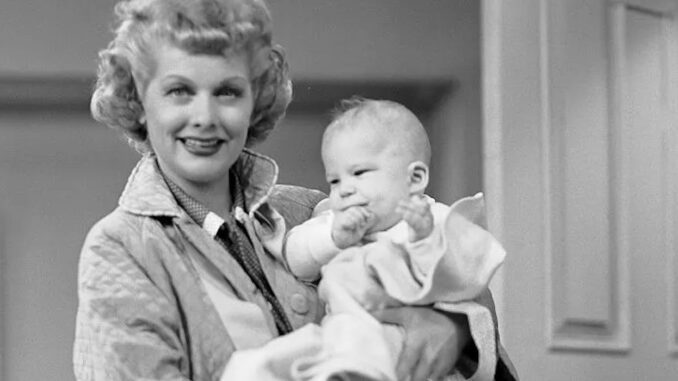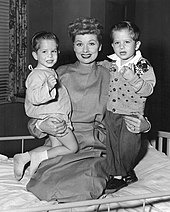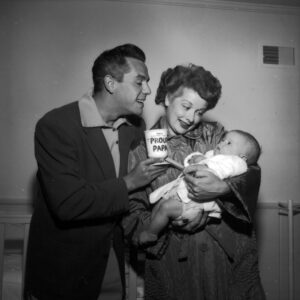
The Fight That Changed Television History
A Revolutionary Moment for TV
In the early 1950s, television adhered to strict censorship rules. Even married couples were rarely shown sharing a bed, let alone discussing more private matters. So, when Lucille Ball became pregnant during the second season of I Love Lucy, the industry faced an unprecedented challenge: should her pregnancy be acknowledged on-screen?
Desi Arnaz: A Trailblazer with a Vision
Desi Arnaz, who played Lucy’s husband Ricky Ricardo on the show, was not just an actor but also a producer. He saw an opportunity to break new ground. But convincing the network and sponsors to include a pregnancy storyline was no easy task. At the time, even the word “pregnant” was considered too risqué for television.
The Cultural Taboo of Pregnancy on TV
Why Pregnancy Was a No-Go Zone
In the conservative climate of the 1950s, television steered clear of anything remotely controversial. Pregnancy was considered too personal and, in some eyes, inappropriate for family viewing.

Lucille Ball’s Real-Life Pregnancy Sparks a Debate
When Ball became pregnant in 1952, Desi Arnaz knew the show faced a dilemma. Would they hide her pregnancy with camera tricks and oversized clothing, or could they take the bold step of incorporating it into the storyline?
The Battle Behind the Scenes
Network Resistance and Sponsor Fears
CBS executives and sponsors were initially horrified by the idea. They feared backlash from audiences and advertisers. However, Arnaz wasn’t one to back down. He argued that many viewers would relate to a storyline about starting a family.
Desi’s Persuasive Strategy
Arnaz cleverly presented the idea as wholesome and relatable. He emphasized that the show had always portrayed marriage realistically, and a pregnancy storyline would only enhance that authenticity.
Writing Around the Word ‘Pregnancy’
The Euphemism Game
One of the more peculiar challenges was language. The word “pregnant” was banned, so writers had to get creative. Instead, they used phrases like “expecting” or “having a baby.”
Approval from Religious Leaders
To ease concerns, Arnaz even sought approval from a panel of religious leaders. Their endorsement played a crucial role in swaying CBS and advertisers.

The Groundbreaking Episode: “Lucy Is Enceinte”
How the Episode Was Structured
The pivotal episode, titled “Lucy Is Enceinte,” used the French word for “pregnant” to sidestep American taboos. It aired on December 8, 1952, and masterfully blended comedy with heartfelt moments as Lucy revealed her pregnancy to Ricky.
Viewer Reactions: A Resounding Success
The audience’s response was overwhelmingly positive. Fans loved seeing Lucy and Ricky’s journey into parenthood, making the episode one of the most memorable in television history.
Lucille Ball’s Real-Life Birth Televised
The Birth Episode Coincidence
In a remarkable twist of timing, the episode where Lucy gives birth aired on the same day Lucille Ball delivered her son, Desi Arnaz Jr., in real life. This synchronicity captivated viewers and cemented the show’s place in TV history.
Record-Breaking Viewership
The birth episode, titled “Lucy Goes to the Hospital,” aired on January 19, 1953, and drew an audience of 44 million people, surpassing even the inauguration of President Dwight D. Eisenhower.
The Legacy of ‘I Love Lucy’s Pregnancy Storyline
Setting a Precedent for Future Shows
The success of Lucy’s pregnancy storyline opened doors for future TV shows to tackle real-life issues. Pregnancy, once considered taboo, became a common theme in sitcoms and dramas alike.
Breaking Barriers for Women on Television
By portraying a pregnant woman as the comedic and capable lead, I Love Lucy challenged outdated norms and paved the way for more authentic female representation on screen.
The Dynamic Partnership of Arnaz and Ball
Desi’s Role as a Producer
Desi Arnaz’s innovative thinking extended beyond this one storyline. As a producer, he was instrumental in developing techniques like the multi-camera setup and live audience recording, which became industry standards.
Lucille Ball: A Pioneer in Comedy
Ball’s comedic genius and willingness to embrace groundbreaking ideas made her an icon. Together, she and Arnaz formed a dynamic duo that revolutionized television.
Conclusion
Desi Arnaz’s fight to include Lucille Ball’s pregnancy in I Love Lucy wasn’t just a win for the show—it was a victory for television as a whole. By challenging outdated taboos, they set a new standard for authenticity and relatability in storytelling. Their bold choices continue to inspire and influence the TV industry today.
FAQs
1. Why was Lucille Ball’s pregnancy a big deal for TV?
At the time, pregnancy was considered too private and controversial for television. I Love Lucy broke that taboo, making it a groundbreaking moment in TV history.
2. How did Desi Arnaz convince CBS to include the pregnancy storyline?
Arnaz used persuasive arguments, emphasizing relatability and securing approval from religious leaders to address the network’s concerns.
3. What is the significance of the episode “Lucy Is Enceinte”?
This episode was the first to incorporate a pregnancy storyline, marking a pivotal cultural shift in television.
4. Did Lucille Ball’s real-life pregnancy align with the show’s timeline?
Yes, in a rare coincidence, Ball gave birth on the same day the episode depicting Lucy’s childbirth aired.
5. How did this storyline influence future TV shows?
The success of I Love Lucy’s pregnancy storyline paved the way for more realistic portrayals of family life, including pregnancy, in future television series.